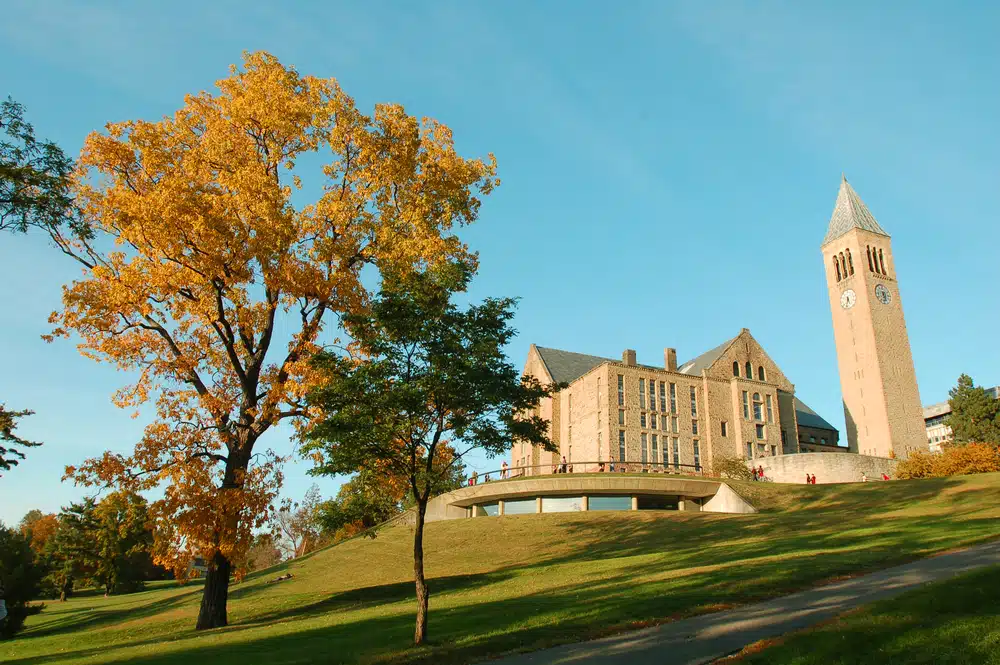A Closer Look at Cornell Medical School
Weill Cornell Medical College was established in 1898 and is known to have a rich history of excellence in medical education, scientific research, and patient care. Also known as Cornell Medical School, it is located in the middle of Manhattan’s Upper East Side in New York City; the campus boasts state-of-the-art teaching, research, and clinical care facilities.
Weill Cornell’s central location provides students access to some of the world’s most prestigious hospitals and research centers. At the same time, its picturesque campus offers a serene environment for study and reflection.
The medical school is affiliated with the larger Cornell University, an Ivy League institution based in Ithaca, New York. Furthermore, Weill Cornell has built strong partnerships with several leading institutions, including NewYork-Presbyterian Hospital, Memorial Sloan Kettering Cancer Center, and Rockefeller University.
These affiliations allow students and faculty to engage in collaborative research and clinical activities, fostering a vibrant academic community committed to advancing knowledge and improving patient care. The integrative approach of Weill Cornell Medical College, along with its strategic alliances, has positioned it as a leading institution in medical education and healthcare, producing some of the world’s finest physicians and medical researchers.
Cornell Academics
Degree Programs
Weill Cornell Medical College offers several prestigious degree programs tailored to meet diverse medical, educational, and career aspirations. The M.D. program is a rigorous four-year curriculum that provides comprehensive medical education, combining basic science coursework with clinical experiences.
The Ph.D. programs offered through the Weill Cornell Graduate School of Medical Sciences emphasize research in biomedical sciences, preparing graduates for successful careers in academia, industry, and government. The Medical Scientist Training Program (MSTP) offers a combined M.D.-Ph.D. degree for students interested in the intersection of medicine and research.
As part of the academic programs offered at Cornell, this competitive program provides integrated training in clinical medicine and biomedical research, preparing graduates for careers as physician-scientists. In addition to these, Weill Cornell offers master’s programs in several areas, such as Clinical Epidemiology and Health Services Research, Health Sciences for Physician Assistants, and Healthcare Policy and Research, providing students with specialized knowledge and skills to excel in their chosen fields.
Departments and Centers
Cornell Medical School is home to many departments and centers, each specializing in different areas of medicine, biomedical research, and patient care. These include the basic science departments such as Biochemistry, Cell and Developmental Biology, and Physiology and Biophysics, among others.
There are also clinical departments, including Anesthesiology, Dermatology, Emergency Medicine, Neurology, Pediatrics, and Surgery, to name a few. Additionally, Weill Cornell boasts various research centers and institutes focusing on specialized research areas. These include the Sandra and Edward Meyer Cancer Center, dedicated to cancer research and patient care; the Feil Family Brain and Mind Research Institute, focusing on neuroscience research; and the Jill Roberts Institute for Research in Inflammatory Bowel Disease, among others.
Academic Calendar and Course Structure
Weill Cornell Medical College follows a traditional academic calendar, typically beginning in August and ending in May, with a summer break in between. This is divided into two semesters: fall and spring, with an additional shorter term in the summer for some programs.
The college’s curriculum is thoughtfully structured to blend classroom learning with practical clinical experiences. The M.D. program, for instance, is divided into a ‘pre-clerkship’ phase in the first two years, focusing on foundational medical knowledge and skills, and a ‘clerkship’ phase in the last two years, emphasizing clinical rotations in various specialties.
The Ph.D. and Master’s programs have distinctive structures, generally comprising coursework, laboratory rotations, and thesis research. Interdisciplinary programs and electives are also offered to enhance students’ learning and provide them with a broad-based education. The academic calendar and course structure are designed to ensure students are well-prepared to excel in their future medical and research careers.
Research Opportunities
Cornell Medical School is renowned for its robust research opportunities, integral to its mission of advancing medical science. Students across all degree programs are encouraged to participate in research activities under the guidance of faculty who are top experts in their fields. The college offers various research opportunities in cancer biology, neuroscience, genetics, immunology, etc.
The research experience often involves hands-on laboratory work, data analysis, and scientific writing, providing students with a comprehensive understanding of the research process. For those in the M.D. program, the Areas of Concentration (AOC) program allows students to engage in longitudinal, mentored research projects in an area of their interest. Ph.D. students, on the other hand, conduct original, high-impact research as a central part of their training.
Cornell Medical School Admissions
Application Process
The application process at Weill Cornell Medical College is designed to identify candidates who demonstrate the potential for excellence in medicine and research. To apply, candidates need to submit their applications through the American Medical College Application Service (AMCAS).
Key requirements include a completed undergraduate degree, Medical College Admission Test (MCAT) scores, letters of recommendation, and a personal statement. In addition, students must demonstrate a strong academic record, particularly in the sciences, and a commitment to service and leadership.
As for the deadlines, the AMCAS application typically opens in early May, with the deadline for submission usually set in October. However, applicants are encouraged by the school to apply early, as Weill Cornell follows a rolling admissions process. Selected candidates are invited for interviews, which are critical to the admissions decision.
These interviews allow the Cornell admissions committee to evaluate the applicant’s interpersonal skills, maturity, and motivation for a career in medicine while also giving applicants an opportunity to understand more about the program and community at Weill Cornell.
Selection Factors
The selection process at Cornell Medical School is holistic and considers a broad range of factors beyond academic performance. While a strong academic record and competitive MCAT scores are important, the admissions committee also considers the applicant’s personal qualities, experiences, and potential to contribute to the Weill Cornell community and the broader field of medicine.
This includes demonstrated leadership roles, community service, clinical experience, and research involvement. Other selection factors include the applicant’s personal statement and letters of recommendation, which provide insight into their character, motivation for pursuing medicine, and potential for success in the program.
The admissions committee also values diversity in its student body and seeks students from various backgrounds, experiences, and perspectives. The goal is to admit a class of students who have the intellectual capabilities to succeed in medicine and the compassion, integrity, and dedication to become future leaders in healthcare.
Tuition and Financial Aid
Weill Cornell Medical College, like many medical schools, requires a substantial financial investment, with tuition and fees for the M.D. program amounting to tens of thousands of dollars per year. However, the institution is deeply committed to ensuring that financial constraints do not prevent talented and deserving students from pursuing their medical education.
To this end, Weill Cornell offers a range of financial aid options. This includes scholarships, grants, loans, and work-study opportunities. The college has implemented a debt-free initiative for all students who qualify for financial aid, replacing student loans with scholarship support.
Financial aid packages are determined based on the student’s financial need, as assessed through the Free Application for Federal Student Aid (FAFSA) and other institutional forms. The college’s Office of Financial Aid is also available to help students and their families understand and navigate the financial aid process.
Cornell Clinical Training
Affiliated Hospitals
Cornell Medical School is affiliated with several top-tier hospitals that provide students with unparalleled clinical training opportunities. The primary teaching hospital is NewYork-Presbyterian Hospital, consistently ranked among the top ranking hospitals in the United States. This affiliation provides students with various clinical experiences across various medical specialties.
In addition, Weill Cornell is closely affiliated with Memorial Sloan Kettering Cancer Center, a world-renowned cancer treatment and research institution, and The Hospital for Special Surgery, a leading orthopedic hospital.
Furthermore, a partnership with Rockefeller University, a premier biomedical research institution, strengthens Weill Cornell’s commitment to translational research. These affiliations offer students diverse and comprehensive exposure to patient care and allow them to learn from leading clinicians and medical researchers in the field.
Clerkships and Rotations
Clerkships and rotations are crucial to the clinical training at Weill Cornell Medical College, particularly during the last two years of the M.D. program. These rotations allow students to gain hands-on experience in a variety of medical specialties under the supervision of experienced physicians. Core clerkships typically include rotations in internal medicine, surgery, pediatrics, obstetrics and gynecology, psychiatry, and neurology, among others.
During these clerkships, students participate in patient care activities, attend ward rounds, and engage in case discussions, thereby learning to apply their classroom knowledge in real-world clinical settings. In addition to the core clerkships, students can pursue elective rotations in their areas of interest.
These rotations can be completed at Weill Cornell’s affiliated hospitals, providing students with broad and diverse exposure to patient care. Clerkships and rotations are integral to students’ professional development, helping them hone their clinical skills, understand the complexities of patient care, and explore potential medical career paths.
Residency and Fellowship Opportunities
After graduating from Cornell Medical School, many students continue their training through residency and fellowship programs. Residency is a postgraduate training period that allows medical school graduates to specialize in a specific field of medicine. Fellowship programs offer further sub-specialization after residency.
Weill Cornell and its affiliated hospitals offer residency and fellowship programs across various specialties, such as internal medicine, surgery, pediatrics, radiology, and many more. These programs are designed to provide comprehensive clinical training, research opportunities, and leadership development to prepare graduates for successful careers in their chosen fields.
Weill Cornell’s graduates have a strong track record of securing residency and fellowship positions in some of the most competitive medical programs in the US, thanks to the strong clinical and academic foundation they receive during their time at the medical college.
Cornell Faculty
Notable Faculty Members
After graduating from Weill Cornell Medical College, many students continue their training through residency and fellowship programs. Residency is a postgraduate training period that allows medical school graduates to specialize in a specific field of medicine. Fellowship programs offer further sub-specialization after residency.
Weill Cornell and its affiliated hospitals offer residency and fellowship programs across various specialties, such as internal medicine, surgery, pediatrics, radiology, and many more. These programs are designed to provide comprehensive clinical training, research opportunities, and leadership development to prepare graduates for successful careers in their chosen fields.
Weill Cornell’s graduates have a strong track record of securing residency and fellowship positions thanks to the strong clinical and academic foundation they receive during their time at the medical college.
Faculty-Student Ratio
Cornell Medical School boasts a faculty of world-class educators, clinicians, and researchers leaders in their respective fields. Among them are numerous notable Cornell faculty members who have created significant contributions to medicine and biomedical research.
These include Dr. Laurie H. Glimcher, an immunologist and the first female President and CEO of Dana-Farber Cancer Institute, who served as the Dean of Weill Cornell Medicine; Dr. Augustine M.K. Choi, an expert in lung disease and the current Dean of Weill Cornell Medicine; and Dr. Lewis C. Cantley, a renowned cell biologist known for his discovery of the PI 3-kinase, an enzyme linked to various cancers.
Other notable faculty members include cardiology, neurology, oncology leaders, and many others. These faculty members contribute to the advancement of medical science and play a crucial role in mentoring the future doctors and scientists at Weill Cornell.
Mentoring and Advising
Weill Cornell Medical College prides itself on its low faculty-student ratio, which allows for personalized attention and mentorship for each student. The college boasts a faculty-student ratio of about 1:4, ensuring that students have ample opportunities for one-on-one interaction and guidance from their professors.
This low ratio benefits classroom settings and clinical rotations, allowing for more individualized instruction and feedback. It also facilitates close mentoring relationships, which can be instrumental in students’ professional development and career planning.
The low faculty-student ratio at Weill Cornell is a testament to the college’s commitment to providing a supportive and nurturing learning environment that fosters each student’s academic and personal growth.
As you learn more about Cornell Medical School, you should also prepare for your college admission. If you wish for guidance in your journey, AdmissionSight will help you through the competitive admissions process. With their team of top experts, you can surely get accepted to the top universities in the world with the help of AdmissionSight. Set up an appointment today and get the best help getting into university.








































